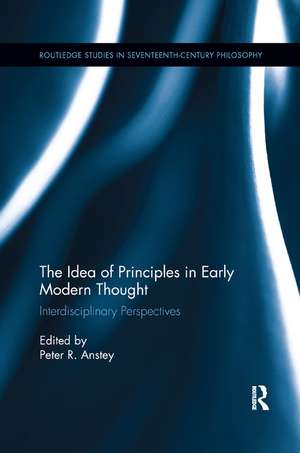The Idea of Principles in Early Modern Thought: Interdisciplinary Perspectives: Routledge Studies in Seventeenth-Century Philosophy
Editat de Peter R. Ansteyen Limba Engleză Paperback – 10 dec 2019
Ranging from mathematics and law to chemistry, from natural and moral philosophy to natural theology, and covering some of the leading thinkers of the period, this volume presents ten compelling new essays that illustrate the centrality and importance of the idea of principles in early modern thought. It contains chapters by leading scholars in the field, including the Leibniz scholar Daniel Garber and the historian of chemistry William R. Newman, as well as exciting, emerging scholars, such as the Newton scholar Kirsten Walsh and a leading expert on experimental philosophy, Alberto Vanzo. The Idea of Principles in Early Modern Thought: Interdisciplinary Perspectives charts the terrain of one of the period’s central concepts for the first time, and opens up new lines for further research.
| Toate formatele și edițiile | Preț | Express |
|---|---|---|
| Paperback (1) | 388.72 lei 6-8 săpt. | |
| Taylor & Francis – 10 dec 2019 | 388.72 lei 6-8 săpt. | |
| Hardback (1) | 1004.20 lei 6-8 săpt. | |
| Taylor & Francis – 14 apr 2017 | 1004.20 lei 6-8 săpt. |
Din seria Routledge Studies in Seventeenth-Century Philosophy
-
 Preț: 395.93 lei
Preț: 395.93 lei -
 Preț: 391.99 lei
Preț: 391.99 lei -
 Preț: 388.30 lei
Preț: 388.30 lei -
 Preț: 487.37 lei
Preț: 487.37 lei -
 Preț: 385.84 lei
Preț: 385.84 lei -
 Preț: 445.77 lei
Preț: 445.77 lei -
 Preț: 381.00 lei
Preț: 381.00 lei -
 Preț: 412.27 lei
Preț: 412.27 lei - 25%
 Preț: 322.05 lei
Preț: 322.05 lei -
 Preț: 467.44 lei
Preț: 467.44 lei -
 Preț: 484.47 lei
Preț: 484.47 lei -
 Preț: 489.10 lei
Preț: 489.10 lei - 18%
 Preț: 892.16 lei
Preț: 892.16 lei -
 Preț: 389.29 lei
Preț: 389.29 lei -
 Preț: 412.19 lei
Preț: 412.19 lei -
 Preț: 449.41 lei
Preț: 449.41 lei -
 Preț: 385.15 lei
Preț: 385.15 lei -
 Preț: 326.45 lei
Preț: 326.45 lei -
 Preț: 484.47 lei
Preț: 484.47 lei -
 Preț: 384.86 lei
Preț: 384.86 lei -
 Preț: 489.57 lei
Preț: 489.57 lei -
 Preț: 386.61 lei
Preț: 386.61 lei -
 Preț: 326.83 lei
Preț: 326.83 lei -
 Preț: 442.62 lei
Preț: 442.62 lei - 18%
 Preț: 891.36 lei
Preț: 891.36 lei - 18%
 Preț: 1004.06 lei
Preț: 1004.06 lei - 31%
 Preț: 762.97 lei
Preț: 762.97 lei
Preț: 388.72 lei
Nou
Puncte Express: 583
Preț estimativ în valută:
74.39€ • 80.78$ • 62.49£
74.39€ • 80.78$ • 62.49£
Carte tipărită la comandă
Livrare economică 22 aprilie-06 mai
Preluare comenzi: 021 569.72.76
Specificații
ISBN-13: 9780367884253
ISBN-10: 0367884259
Pagini: 320
Dimensiuni: 152 x 229 x 17 mm
Greutate: 0.43 kg
Ediția:1
Editura: Taylor & Francis
Colecția Routledge
Seria Routledge Studies in Seventeenth-Century Philosophy
Locul publicării:Oxford, United Kingdom
ISBN-10: 0367884259
Pagini: 320
Dimensiuni: 152 x 229 x 17 mm
Greutate: 0.43 kg
Ediția:1
Editura: Taylor & Francis
Colecția Routledge
Seria Routledge Studies in Seventeenth-Century Philosophy
Locul publicării:Oxford, United Kingdom
Public țintă
Postgraduate and UndergraduateCuprins
Introduction
Peter R. Anstey
1. Early Modern Mathematical Principles and Symmetry Arguments
James Franklin
2. The Development of Principles in Equity in the Seventeenth Century
Joe Campbell
3. Alchemical and Chymical Principles: Four Different Traditions
William R. Newman
4. The Two Comets of 1664–1665: A Dispersive Prism for French Natural Philosophical Principles
Sophie Roux
5. Corpuscularism and Experimental Philosophy in Domenico Guglielmini’s Reflections on Salts
Alberto Vanzo
6. The Principles of Spinoza’s Philosophy
Michael LeBuffe
7. Principles in Newton’s Natural Philosophy
Kirsten Walsh
8. Leibniz on Principles in Natural Philosophy: The Principle of the Equality of Cause and Effect
Daniel Garber
9. Experimental Philosophy and the Principles of Natural Religion in England, 1667–1720
Peter R. Anstey
10. A Conflict of Principles: Grotius’ Justice versus Hume’s Utility
Kiyoshi Shimokawa
Peter R. Anstey
1. Early Modern Mathematical Principles and Symmetry Arguments
James Franklin
2. The Development of Principles in Equity in the Seventeenth Century
Joe Campbell
3. Alchemical and Chymical Principles: Four Different Traditions
William R. Newman
4. The Two Comets of 1664–1665: A Dispersive Prism for French Natural Philosophical Principles
Sophie Roux
5. Corpuscularism and Experimental Philosophy in Domenico Guglielmini’s Reflections on Salts
Alberto Vanzo
6. The Principles of Spinoza’s Philosophy
Michael LeBuffe
7. Principles in Newton’s Natural Philosophy
Kirsten Walsh
8. Leibniz on Principles in Natural Philosophy: The Principle of the Equality of Cause and Effect
Daniel Garber
9. Experimental Philosophy and the Principles of Natural Religion in England, 1667–1720
Peter R. Anstey
10. A Conflict of Principles: Grotius’ Justice versus Hume’s Utility
Kiyoshi Shimokawa
Notă biografică
Peter R. Anstey is Professor of Philosophy at the University of Sydney. He specializes in early modern philosophy with a particular focus on the philosophy of John Locke, experimental philosophy, and the philosophy of principles. He is the author of John Locke and Natural Philosophy (2011) and editor of The Oxford Handbook of British Philosophy in the Seventeenth Century (2013).
Recenzii
"This fascinating collection provides case studies allowing the reader to appreciate how many and how varied are the ways in which the concept of a principle has been deployed and to what effect in the early modern period." – Margaret Atherton, University of Wisconsin-Milwaukee, USA
Descriere
This collection of essays breaks new ground in bringing together scholars from a range of disciplines to focus on the nature and status of principles in early modern thought. A comprehensive introduction argues that there is a natural "fault line" between propositional and ontological principles, and establishes a clear understanding of how the
